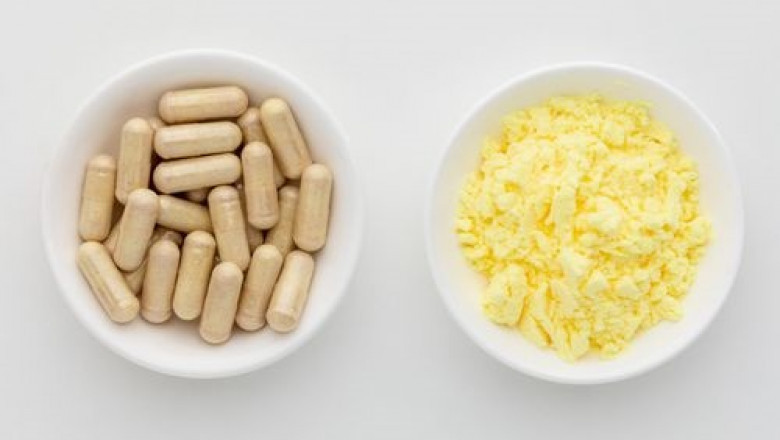views
What is Alpha-Lipoic Acid?
Alpha-Lipoic acid (ALA) is a naturally occurring fatty acid found in human cells. It is produced enzymatically in small amounts by the liver and other tissues. ALA plays an important role as a cofactor for mitochondrial enzyme complexes involved in energy metabolism. It participates in many redox reactions that release energy from metabolism of carbohydrates and fats. In addition to its role in energy production, ALA is a robust fat and water-soluble antioxidant that can protect cells from oxidative damage caused by free radicals.
Antioxidant Properties of Alpha-Lipoic Acid
As an antioxidant, Alpha-Lipoic Acid is capable of scavenging reactive oxygen species (ROS) such as superoxide, hydroxyl radicals, and hypochlorous acid. It can directly interact with and neutralize these reactive molecules. ALA is considered a universal antioxidant because it can act in both aqueous and lipid parts of the cell. This makes it uniquely positioned to protect vulnerable membranes and molecules from oxidation. In addition to direct interaction with ROS, ALA also helps regenerate other antioxidants like vitamin C, vitamin E, and glutathione. This recycling ability significantly amplifies its antioxidant power. Studies show ALA may be at least twice as effective at reducing oxidative damage as other well-known antioxidants like vitamin C and vitamin E.
Role in Glucose Metabolism and Diabetes
Due to its involvement in energy production as well as antioxidant effects, ALA supplementation has benefits for metabolism and blood sugar control. ALA appears to enhance cellular glucose uptake and utilization by facilitating insulin signaling pathways. It also protects pancreatic beta cells from oxidative damage, preserving insulin production. For these reasons, ALA supplementation has shown promise in improving symptoms of diabetes. Several clinical trials have found ALA can improve glycemic control, reduce diabetic complications, and enhance insulin sensitivity in people with type 1 and type 2 diabetes. ALA may help manage blood sugar levels and support overall health even in non-diabetics.
Benefits for Neurological Health
The brain is very susceptible to oxidative stress due to high metabolic activity and oxygen consumption. ALA plays an important role in maintaining neuronal health by protecting neurons from damage by ROS. Studies show ALA crosses the blood-brain barrier effectively and accumulates in brain tissue. This allows it to provide antioxidant support directly to the nervous system. ALA supplementation has been shown to improve cognitive function and help prevent neurological disorders related to oxidative stress like Parkinson's and Alzheimer's disease in both animal and human studies. By protecting nerve cells from free radical attack, ALA may help slow degeneration and support memory, focus, and overall brain health as we age.
Cardioprotective Effects
The heart relies heavily on fatty acid oxidation for fuel and is constantly exposed to oxidative stress. This can accelerate cellular damage, inflammation, and atherosclerosis over time. Due to its ability to neutralize lipid-based free radicals and regenerate antioxidants like CoQ10, ALA has direct benefits for cardiovascular health. Studies show ALA supplementation can help reduce risk factors for heart disease by improving endothelial function, blood pressure, cholesterol levels, and decreasing inflammation. It also protects heart muscle cells from ischemic damage during heart attack or failure. Some research indicates ALA may be as effective as synthetic drugs for managing angina symptoms from coronary artery disease without serious side effects.
Anti-inflammatory Activity
Systemic inflammation driven by cytokines, macrophages, and oxidative stress contributes to many chronic health conditions from cancer to arthritis. As a potent antioxidant, ALA supplementation has demonstrated anti-inflammatory effects through inhibiting activation of major inflammatory pathways such as NF-kB. This helps calm inflammation at the molecular level throughout the body. Some research suggests ALA plays a role in preventing inflammatory bowel diseases and may aid in recovery from ulcerative colitis. The anti-inflammatory actions of ALA may also help ease symptoms of arthritis and back/joint pain when combined with other natural supplements or lifestyle changes.
Protects Against Oxidative DNA Damage
DNA is constantly exposed to oxidative damage from ROS that can lead to mutations and cancer over time. Due to its universal distribution and recycling power, ALA provides robust protection to DNA inside the nucleus and mitochondria. Studies have found ALA can directly counteract DNA damage and mutations caused by superoxide, singlet oxygen, hydroxyl radicals and peroxynitrite exposure. This antioxidant activity at the genetic level translates to potent anti-mutagenic and anti-carcinogenic properties. Some research shows ALA may help prevent certain cancers like melanoma by inhibiting metastasis, protecting healthy cells from carcinogens, and inducing apoptosis of precancerous cells.
Cautions and Toxicity
Overall ALA supplementation appears to be very safe even at high doses. The main cautions are in regard to potential drug interactions if taken alongside certain prescription medications that are broken down in the liver including blood thinners, diabetes drugs, or other supplements. Pregnant or breastfeeding women should check with their healthcare provider before using ALA supplements. Otherwise ALA is generally recognized as safe in recommended doses for up to six months. Side effects if any are mild and may include nausea, diarrhea or abdominal pain in some sensitive individuals. More research is still needed regarding long term safety, but doses up to 600 mg per day appear to be well tolerated in most cases.
With its wide availability as a dietary supplement and excellent safety profile even at high doses, ALA holds great potential for maintaining health and treating multiple conditions safely through natural means. Regular ALA supplementation can provide robust antioxidant protection, enhance glucose metabolism, support brain and cardiovascular function, calm systemic inflammation, and protect genetic material from DNA damage. Further research will continue to uncover additional therapeutic benefits of this unique and versatile nutrient within the field of nutrition and integrative medicine.
Get this Report in Japanese Language:
Get this Report in Korean Language:
About Author:
Money Singh is a seasoned content writer with over four years of experience in the market research sector. Her expertise spans various industries, including food and beverages, biotechnology, chemical and materials, defense and aerospace, consumer goods, etc. (https://www.linkedin.com/in/money-singh-590844163)






















Comments
0 comment